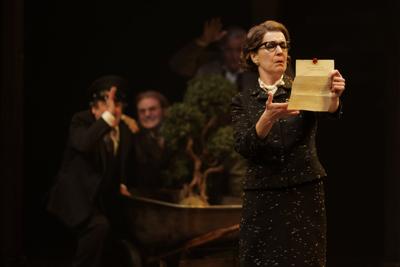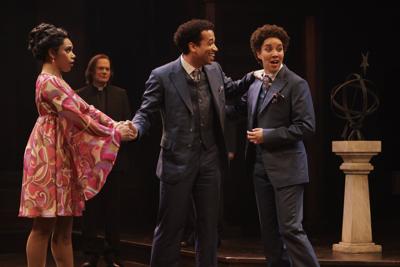STRATFORD, ONT. — It’s often forgotten that Shakespeare provided an alternate title for “Twelfth Night,” his romantic comedy of mistaken identities and unrequited love. And it’s quite telling that director Seana McKenna, whose gender-bent production of the play officially opened the Stratford Festival on Monday night, in her program notes refers to the work by its secondary name.Â
Sure, “What You Will” might not have the same ring as “Twelfth Night,” and that three-word moniker may evoke a sense of dull vagueness. But on closer consideration, it’s a title that feels apt to describe McKenna’s intriguing interpretation of the dark comedy, which toys with ideas of how free will and desire clash against reality.Â
Indeed, you could argue that those competing traits are present at every age; each generation wants nothing more than to forge their own path, untethered from the expectations that society lays out for them. But McKenna’s decision to set the play in the 1960s, on the eve of the Summer of Love, thrusts these themes to the fore.Â
McKenna’s characters in this production may be situated on the periphery of the counterculture revolution — thankfully, Christina Poddubluk’s understated costumes and sets don’t bludgeon the audience with a flower power esthetic — but they are no less swept away by their untamed desires, even if those impulses might conflict with their present realities.Â
When a shipwreck separates Viola (Jessica B. Hill) from her twin brother Sebastian (Austin Eckert), she disguises herself as a page named Cesario and serves in the court of Duke Orsino (André Sills). But Viola, now dressed as an adolescent boy, is soon smitten with her employer.
The duke, in turn, is haplessly in love with Countess Olivia (Vanessa Sears), despite all signs suggesting she is thoroughly disinterested. The love triangle is closed as Olivia falls passionately in love with Cesario, though the countess knows she should be deep in mourning over the death of her brother.Â

Laura Condlln as Malvolio with, from left, Michael Spencer-Davis as Fabian, Rylan Wilkie as Sir Andrew Aguecheek and Scott Wentworth as Sir Toby Belch in “Twelfth Night” at the Stratford Festival.Â
David Hou/Stratford FestivalThis storyline, however, feels secondary in McKenna’s production, which shifts the focus to the hijinks of Olivia’s household, where head servant Malvolio has been duped into believing that the countess is secretly in love with her.Â
Yes, Malvolio is now a she. In a genius bit of casting, Malvolio is here portrayed as a woman, by the talented and protean Laura Condlln, simply brilliant in the role with her impeccable comic timing on full display.Â
Condlln’s Malvolio initially comes across as a severe disciplinarian, walking with a strict gait and curdling every consonant off the tip of her tongue, like the Shakespearean equivalent of a Professor Snape or Miss Trunchbull. It makes her transformation into a childish fool — with hideous yellow cross-garters — all the more hilarious when the prospect of love is dangled in front of her, the result of a cruel joke pulled by Olivia’s uncle, Sir Toby Belch (Scott Wentworth, nailing the crabby, drunken humour), along with his cronies Maria (Sarah Dodd), Sir Andrew Aguecheek (Rylan Wilkie) and Feste (Deborah Hay, dressed as a guitar-strumming hippie in this other gender-bent role).Â
Switching Malvolio’s gender is not a novel idea. In 2017 at the National Theatre of Great Britain, English actor Tamsin Greig was sensational as a female Malvolia in director Simon Godwin’s production, which switched the genders of several key characters in a similar manner to this current Stratford revival.Â
Condlln and McKenna, however, find new shades of complexity — and humour — in their rendering of Malvolio. There’s a disquieting undercurrent that courses throughout this portrayal, especially in the second act scene where Malvolio is imprisoned because of her lovestruck madness. It’s also an interpretation that leans into the play’s themes of gender and sexual fluidity.Â
But the problem with this shift in focus toward Malvolio, be it intentional or otherwise, is that the other plot line occasionally feels like an afterthought.Â
It’s not that there’s a lack of talent among the actors playing the lovelorn trio. Hill’s Viola is zealous and almost throws herself at Orsino; as Olivia, Sears blossoms like a rose throughout the play; and Sills presents a torn and tortured portrait of Orsino.Â
But together, there’s almost a guise of insincerity in their yearning, as if it’s a fairy-tale sort of infatuation, more befitting of the lovers in “A Midsummer Night’s Dream” than “Twelfth Night.”Â
The rest of McKenna’s minimalist production is efficient and holds few surprises. She makes dynamic use of the Festival Theatre’s thrust stage, with seamless transitions that leverage Bonnie Beecher’s sea-washed lighting designs.
Above the stage is the centrepiece of Poddubluk’s simple set: a metallic kinetic sculpture that resembles an array of flower petals, twisting and turning freely in the breeze. It’s an almost perfect symbol of the wandering desires of the characters below, in a production that raises fascinating ideas about them but feels uneven in its focus.Â































To join the conversation set a first and last name in your user profile.
Sign in or register for free to join the Conversation